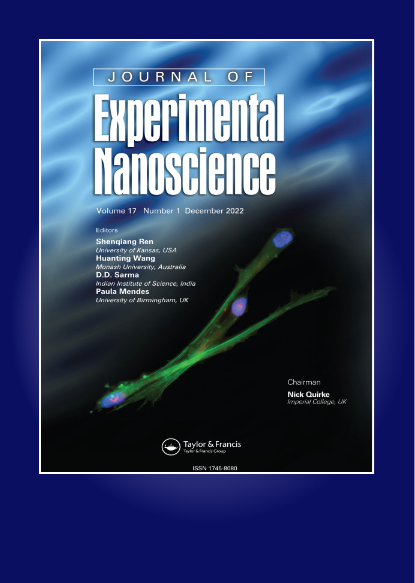吉非替尼聚己内酯纳米颗粒抗NCI-H460细胞的遗传毒性及体外研究
IF 2.6
4区 材料科学
Q2 CHEMISTRY, MULTIDISCIPLINARY
引用次数: 8
摘要
摘要对于癌症(NSCLC)的治疗,BCS II类药物吉非替尼被广泛使用。由于生物利用度差,药物释放不可控,吉非替尼出现了副作用。为了避免这些相关问题,使用Box-Behnken设计开发了具有三种不同分子量PCL(平均Mn~10000、Mn~45000和Mn~80000)的优化吉非替尼包封聚己内酯(PCL)纳米颗粒,同时了解了纳米颗粒的关键工艺参数的影响。使用SEM、TEM、AFM进行形态表征。血液相容性、血小板聚集和红细胞膜完整性测试用于测试纳米颗粒的生物相容性;在这些试验中报告了良好的生物相容性。体外药物释放研究证实,吉非替尼-PCL10000NP、吉非替尼布-PCL45000NP和吉非替尼·PCL80000 NP显示出显著的初始爆裂效应,随后的纳米颗粒具有零级动力学。通过胞质分裂阻断微核(CBMN)试验评估PCL纳米粒子的遗传毒性,表明NCI-H460细胞的DNA损伤以及微核和核芽的形成。此外,活性氧研究,24和48小时MTT细胞毒性测定 h、 还进行了稳定性、优化的荧光吉非替尼PCL80000NP的体外细胞摄取和细胞凋亡研究。因此,研究稳定的吉非替尼负载的聚己内酯(PCL)纳米颗粒可以开辟新的研究途径,有可能降低副作用,改善吉非替尼治疗NSCLC的效果。本文章由计算机程序翻译,如有差异,请以英文原文为准。
Genotoxicity and in vitro investigation of Gefitinib-loaded polycaprolactone fabricated nanoparticles for anticancer activity against NCI-H460 cell lines
Abstract For non-small cell lung cancer (NSCLC) treatment, a BCS class II drug, Gefitinib, was widely used. Due to poor bioavailability, uncontrollable drug release, Gefitinib witnessed side effects. To circumvent such associated problems, optimized Gefitinib encapsulated polycaprolactone (PCL) nanoparticles with three different molecular weights of PCL (average Mn∼10,000, Mn∼45,000 & Mn∼80,000) were developed using Box–Behnken design while understanding the influence of critical process parameters of the nanoparticles. For morphological characterizations, SEM, TEM, AFM were used. Hemocompatibility, platelet aggregation, and erythrocyte membrane integrity tests were used to test nanoparticles for biocompatibility; excellent biocompatibility was reported during these tests. The in-vitro drug release studies confirmed that Gefitinib-PCL10,000NPs, Gefitinib-PCL45,000NPs, and Gefitinib-PCL80,000 NPs, show significant initial burst effects, and later nanoparticles possessed zero-order kinetics. The genotoxicity of PCL nanoparticles was assessed by cytokinesis-block micronucleus (CBMN) assay, indicating DNA damage in NCI-H460 cell and micronuclei and nuclear buds’ formation. Further, reactive oxygen species studies, MTT cytotoxicity assays at 24 & 48 h, stability, in-vitro cellular uptake of optimized fluorescent Gefitinib PCL80,000NPs, and apoptosis studies were also carried out. As a result, investigating stable Gefitinib-loaded poly-caprolactone (PCL) nanoparticles could open up new research avenues, potentially lowering side effects and improving Gefitinib's profile in the treatment of NSCLC.
求助全文
通过发布文献求助,成功后即可免费获取论文全文。
去求助
来源期刊

Journal of Experimental Nanoscience
工程技术-材料科学:综合
CiteScore
4.10
自引率
25.00%
发文量
39
审稿时长
6.5 months
期刊介绍:
Journal of Experimental Nanoscience, an international and multidisciplinary journal, provides a showcase for advances in the experimental sciences underlying nanotechnology and nanomaterials.
The journal exists to bring together the most significant papers making original contributions to nanoscience in a range of fields including biology and biochemistry, physics, chemistry, chemical, electrical and mechanical engineering, materials, pharmaceuticals and medicine. The aim is to provide a forum in which cross fertilization between application areas, methodologies, disciplines, as well as academic and industrial researchers can take place and new developments can be encouraged.
 求助内容:
求助内容: 应助结果提醒方式:
应助结果提醒方式:


